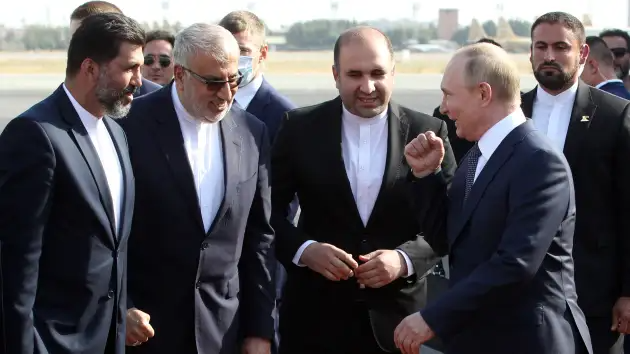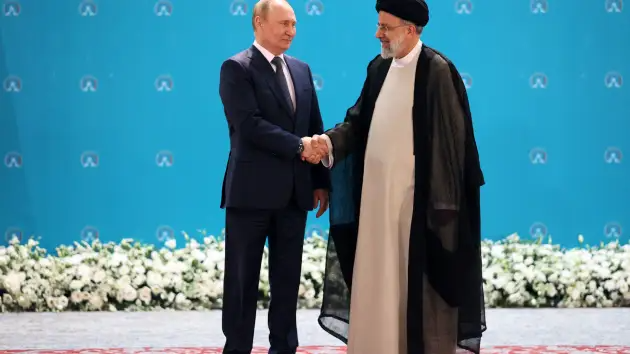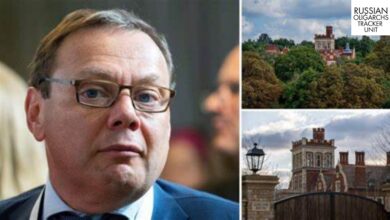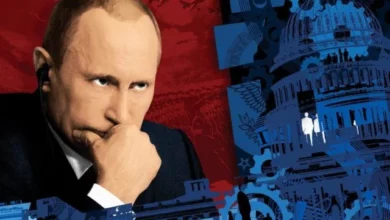Russia is turning increasingly hostile toward Israel as it picks sides in the Middle East
As it takes a side in the ongoing conflict in the Middle East, Russia is becoming increasingly antagonistic toward Israel.

- When the conflict between Israel and Hamas broke out a month ago, Russia’s early response was notable for its restraint and moderation.
- It was believed that the Kremlin was assessing its competing and conflicting vested interests in the Middle East, which led to Russia’s measured response to the situation in the region.
- Russia’s relationship with Israel has historically been one of mutual respect and cooperation.
- Benjamin Netanyahu, the Prime Minister of Israel, and Vladimir Putin, the President of Russia, have maintained a warm and friendly relationship.
Russia is turning increasingly hostile, which was noticeably muted when it first broke out a month ago. They made circumspect remarks calling for peace and an end to violence.
As Israel’s military campaign in the Hamas-run Gaza Strip intensifies and more than 10,000 Palestinians lose their lives in the heavily bombed region, Russia is abandoning its previously neutral stance and openly expressing hostility and criticism towards Israel.

Russia’s first measured response to the violence was thought to be the outcome of the Kremlin carefully weighing its competing and conflicting interests in the Middle East.
Read : Car Bomb Attack in Eastern Ukraine: Russia-Backed Politician Assassinated
Russia and Israel have maintained cordial relations for a long time, and Russian President Vladimir Putin and Israeli Prime Minister Benjamin Netanyahu have a close relationship and are dedicated to fortifying their bilateral relations.

Russia’s ties with Iran, Israel’s main foe, have improved dramatically in the last few years. Since Russia invaded Ukraine in 2022, this relationship has only become stronger as Moscow has become more and more dependent on Moscow, especially for the delivery of weapons like drones that are used in the fighting.
In light of these circumstances, Russia was put in a tough situation on October 7, when the militant group Hamas, which receives support from Iran, launched an offensive on Israel that resulted in the deaths of almost 1,400 people and the kidnapping of over 240 hostages. Russia remained cautious about publicly endorsing Israel or denouncing Hamas.

Read : Ukraine war: Kyiv military commanders pressured by deadly Russian strike
Russia has become more and more critical of Israel’s military operations, particularly when those operations start to conflict with Russia’s regional interests and alliances. Israel’s attacks in Syria, a nation where Moscow has military bases and supports its government, are one example of this.

Mark Galeotti claims that maintaining a careful equilibrium is becoming more and more difficult for Russia. This is due to Russia’s determination that its ties to nations like Saudi Arabia and Iran, which both produce oil, are more strategically and economically significant than its ties to Israel.
In the end, it’s evident from analyzing Russia’s geopolitical objectives that Moscow needs Saudi Arabia and Iran. Saudi Arabia is equally important as Iran because their combined influence can have a major impact on world oil prices. Iran is essential because it is a reliable supplier of military resources. Russia is therefore forced to compromise its ties with Israel within this broader geopolitical context.
Russia turns against Israel
Because of the conflict’s obvious effects on Russia’s military and geopolitical concerns, the country’s stance has changed significantly in recent weeks.
When Israel launched airstrikes on several Syrian military locations in October in response to a series of missile attacks on Israel, Russia’s Foreign Ministry stated that it believed these actions violated Syria’s “sovereignty and international law.” Later that month, Russian Foreign Minister Sergei Lavrov declared the strikes to be “inadmissible.”

Russia increased pressure on Israel at the same time Russian Foreign Minister Sergei Lavrov made his remarks by hosting a delegation from Hamas in Moscow in late October to talk about the problem of hostages held by the organization.
Read : NATO announce Russia’s CFE treaty withdrawal, suspend its operation
On October 28, Russian Foreign Minister Sergei Lavrov gave his most forceful speech yet, declaring that Israel’s war on Gaza was illegal under international law and that it might have disastrous effects that would linger for decades or even centuries. On November 2, Russia’s ambassador to the UN, Vasily Nebenzya, repeated these remarks, claiming that Israel, as an “occupying state,” did not have the legal authority to defend itself under international law.
During a meeting with senior government and security officials, Vladimir Putin voiced his disdain of the Gaza humanitarian disaster. Vladimir Putin said that the current situation in Gaza, where a great number of innocent people are dying from bombardment without any way to escape, is unacceptable in a speech that was broadcast on television on October 30. He focused on the heartbreaking images of wounded and dead children, the agony of mothers and the elderly, and the loss of medical professionals. Additionally, Putin insinuated that the Western nations stand to gain from further instability in the Middle East by drawing a link between the Gaza crisis and their interests.
Russia’s stance towards Israel has already become markedly more critical,” Tatiana Stanovaya, senior fellow at the Carnegie Russia Eurasia Center and the founder of analysis firm R.Politik, said in her Weekly Digest analyzing Russian news.
Stanovaya pointed out that although Vladimir Putin has avoided openly criticizing Israel, he still “views the country as part of an American policy aimed at destabilization and sowing chaos.”
“Moscow increasingly sees Tel Aviv as aligning with Washington’s sphere of influence—an assessment that inherently marginalizes the importance of Israel to the Kremlin by tying it to Russia’s broader geopolitical contest with America. By implication, there will be less incentive for the Kremlin to maintain and invest in a balanced policy towards Tel Aviv, as it had done previously,” she noted.
Read : Russian Legislator Proposes Establishing a ‘Ministry of Happiness’ Due to Public Discontent with the War
Frankly, before the present war, relations with Israel were deteriorating, with Western-backed Israel caught in a difficult situation following Russia’s invasion of Ukraine.
Israel and other Western countries were under pressure to denounce the invasion and impose penalties on Russia. Unlike other allies, it resisted, refusing to apply sanctions and providing humanitarian help to Ukraine instead of military support. Nevertheless, it appeared that its ambiguous position irritated both Russia and the West.
Given that Israeli Prime Minister Netanyahu is becoming less and less popular, Galeotti pointed out that Russia was probably factoring in the possibility that, in any event, its ties with Israel may alter if there is a leadership transition.
“I think there’s also the calculation that actually Netanyahu’s days in power may well be numbered and a new government might well actually be much more Russia skeptical,” he said.
“Russia would love to to have its cake and eat it but when it comes down to it, if it has to pick sides, it has to be with an eye to Iran and Saudi Arabia.”







